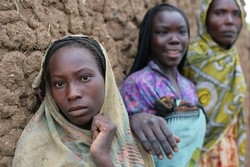
Africa may face centuries of poverty. Social Watch has developed a basic capabilities index that shows that economic growth does not necessarily produce drops in poverty levels. In fact, “the basic needs required to escape poverty persists; even more, it is increasing, in spite of impressive economic growth in most developing countries.” Meanwhile, according to the Social Gender Equity Index, “More than half the women in the world live in countries that have made no progress in gender equity in recent years.” And this has nothing to do with lack of resources. It’s about decisions that governments, that people in government, mostly men, make … freely.
Everyone is `astounded’: “Reed Brody, a campaigner with Human Rights Watch, said it was `astounding’ that 60 percent of the world’s countries have made no progress in recent years in expanding female access to education. He called for increased investment in the realisation of basic entitlements as part of a `human rights stimulus package. When you free women from the discrimination and poor health that they face in their daily lives, you unleash the powers of half of humanity to contribute to economic growth,’ he said ‘.” `Free women’ to become productive laborers; `free women’ to sell their free labor freely? At the heart of the human rights version of women in the world is precisely this liberal bourgeois capitalist model: the problem with women is women aren’t free laborers.
As long as freedom is viewed as an economic term, as long as freedom is `justified’ because it produces and reproduces `economic growth’, there will be no freedom. But don’t worry. Global warming will lead to a perpetual food crisis. In the by and by of the perpetual food crisis, we will all be free to starve. According to climate researcher David Battisti, “This is going to unfold in the next 100 years.” So, the developing world need not worry about basic this and gender that. Time is no longer of the essence, time has become the substance.
Where is all this food not going? According to Mike Davis, to urban slums in the global neoliberal metropole. For Davis, the failed state is more often than not a failed city, and the role of empire is to figure out what do about the failures: “The most interesting thing happening right now is the joint efforts of the US and Brazil in Port-au-Prince, Haiti. I would argue that the US sees that effort as a possibility to test and develop strategies to stabilise cities by means of security measures, city planning and social efforts.” The militarization of social space is not new, and, as women have known for centuries, it emerges as much from boardrooms and bedrooms as it does from war rooms. There must be something more interesting.
How about this: a hundred or so women in Chad, carrying knives and sticks and who knows what else, march through the streets, organize, take charge, do things. Cécile Moutouba. Larlem Marie. Others who chose to remain anonymous. Freedom.
Freedom, not because it’s economically viable, but because it’s freedom. The refusal to accept bare life, the refusal to accept extermination, the refusal to accept violence, the refusal to accept `the acceptable’, the refusal to accept failure. These hundred or so women in Chad are making freedom, and that production is as real as any goods production, as any economic growth that doesn’t pull women out of poverty or anything else.
(Photo Credit: Unicef/Giacomo Pirozzi)